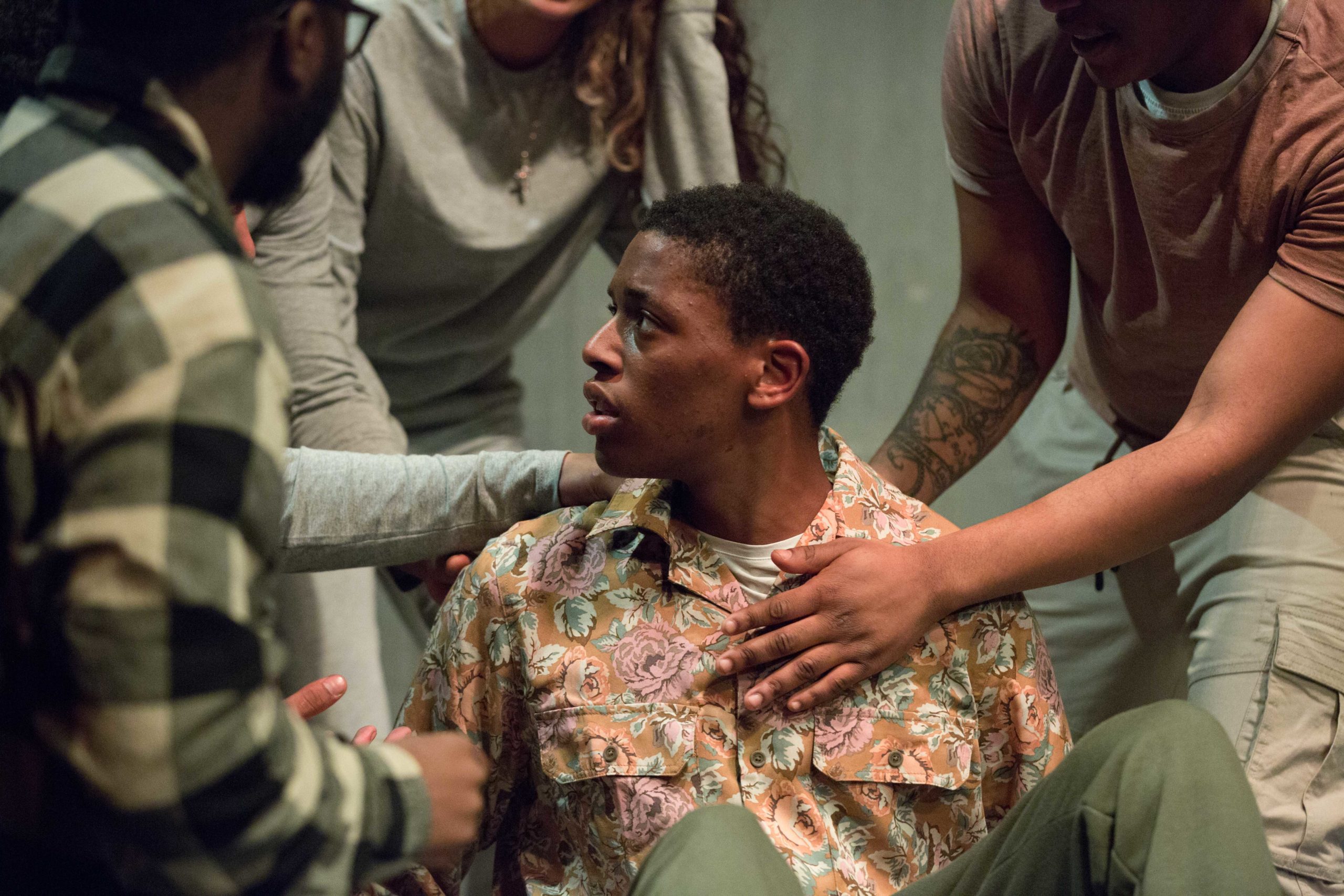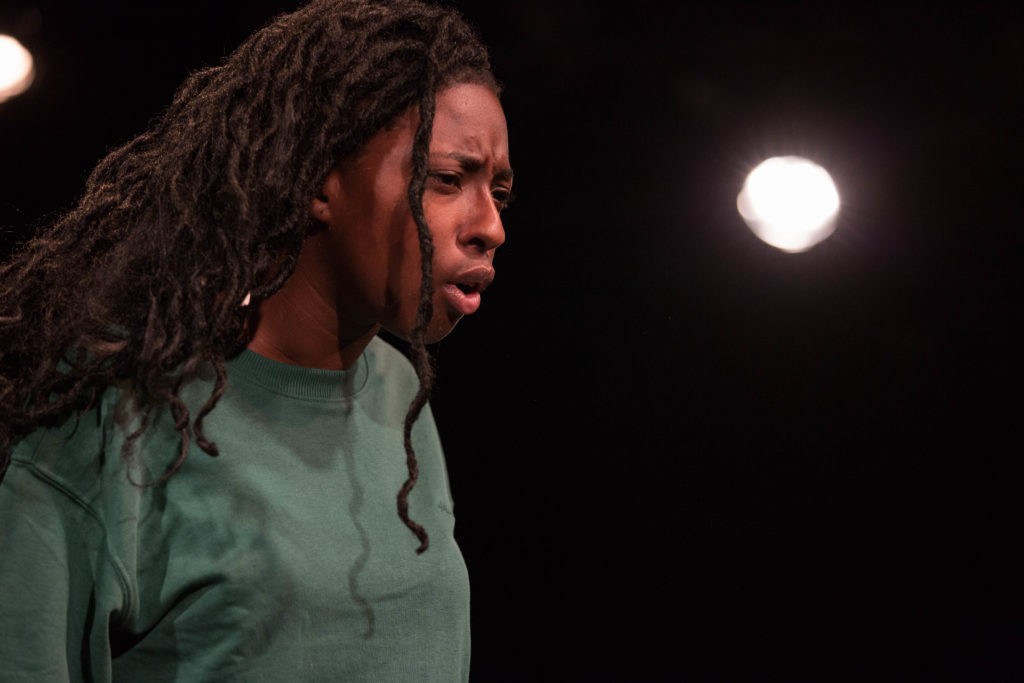Juliet & Romeo – Intermission Youth Theatre/Chelsea Theatre, London
A review of Juliet & Romeo, on now at the Chelsea Theatre in a production by Intermission Youth Theatre. This powerful reworking of Shakespeare shows why this quintessential tale of young love is at its best when led by young people.
Lead image: Chadrack Mbuini as Romeo.
Image credit: Richard Jinman.
Intermission Youth Theatre
I had my first opportunity over the weekend to see the work of Intermission Youth Theatre. An initiative founded in 2008 between actor Darren Raymond, Bishop Rob Gillion, and Janine Gillion, Intermission runs a ten-month drama programme for young people living from disadvantaged backgrounds. Over 150 have now completed the programme and, through outreach programmes in schools, pupil referral units and young offenders institutions, thousands more have been impacted. Many of the programme’s graduates have gone on to further drama studies and professional careers on stage.
What is interesting about Intermission is that at its core is Shakespeare. Each year, the new cohort take one of Shakespeare’s plays, and rework it. Shakespeare is a perfect candidate for this sort of exercise. We know that his plays contain universal themes and emotions: love, jealousy, betrayal, death, and of course humour. They also, as we will see here, stand up to disassembly and reassembly; the whole still recognisable while incorporating something new and fresh. This collaborative process, taking place over many months of rehearsals, bolsters confidence and sets aspirations high. It’s a great concept, and the proof is in the success of its productions and graduates.
The subject of today’s review is Intermission’s 2021 production, Juliet & Romeo, currently on at Chelsea Theatre. So without further ado, let’s take a look.
Juliet & Romeo
I’ve seen Romeo & Juliet before. Including a creative online version earlier this year. This version includes two major departures from the original. Firstly it is gender-swapped. Juliet is a Montague, Romeo is a Capulet. Juliet initiates the relationship, and each performs the other character’s most recognisable lines. Secondly, it is contemporary, taking place in London. The Capulet/Montague rivalry becomes a postcode rivalry. The backdrop is one of Covid and Black Lives Matter. The dialogue is a blend of original Shakespearean verse, and new, modern lines.
I knew about both of these changes before seeing the play, but I hadn’t quite appreciated how much of an impact they would have. Or understood how effective they would be. Juliet as the pursuer, and Romeo as the shy, inexperienced one, is a whole new dynamic. And where I tend to find the original version a bit too dramatic (right about the point of Romeo’s banishment when everyone makes out like this is the worst thing in the world), this contemporary version packs so much more of a punch. You’ve killed the person who killed your friend? You can’t outrun that, no matter how much you love this guy you’ve just met.
The other smart inclusion in this version is a chorus. I think this is partly practical – this plus two castings (the Romeo Cast and Juliet Cast) ensure that the whole cohort are involved in the production. The chorus is also, as choruses always are, an excellent way to introduce commentary. They are ever-present but invisible to the characters, in grey against a grey set. Their function, as described by the cast in a post-show talk (stay for this if you come to see Juliet & Romeo, it’s a great added extra), is to try to prevent and to lament the unnecessary deaths of the play. In London, with all its struggles with knife crime, this is powerful.
A Play About Young Love, By Young People
“For never was a story of more woe, than this of Juliet and her Romeo.” Full of woe it certainly is, in this reworked version as in the original. Putting it back into the hands of young people, however, makes the tragedy all the more poignant. The actors are of an age where the power of first love is keenly felt, and they bring this passion to their performances.
There are some truly impressive performances here. Ophelia J. Wisdom as Juliet and Chadrack Mbuini as Romeo have good chemistry, and lean into the nuance that the gender-swapping allows their characters. My picks, however, are two of the supporting roles. Niara Rowe is an excellent Mercutio. She is funny and serious by turns, taking on some of the production’s contemporary social commentary without it feeling inauthentic. And Megan Samuel as Capo, Romeo’s older sister, turns in a brilliant performance. She is so genuine, her character so fully-formed, that the climactic scenes of the play are harrowing. What a talent.
But in the end it is the company as a whole who shine in Juliet & Romeo. They have collaborated over months to pull this production together. They lean on the strengths in their cohort – the casting plays to talents for comedy and candour, the chorus are tight-knit, as they must be to deliver their lines in unison. And in the ‘talk back’ after the show you get to see the energy they bring to their work, the pride they have in the finished product.
I’m so glad I had the opportunity to see Juliet & Romeo. I hope I will see some of these young actors pop up in future performances: by chance I had already seen one of them (Michael Sookhan) at a local festival so the process has already begun. What an incredible programme Intermission have developed, and what an incredible pipeline of young acting talent.
Salterton Arts Review’s rating: 4/5
Juliet & Romeo on until 4 December 2021
If you see this after your page is loaded completely, leafletJS files are missing.





2 thoughts on “Juliet & Romeo – Intermission Youth Theatre/Chelsea Theatre, London”